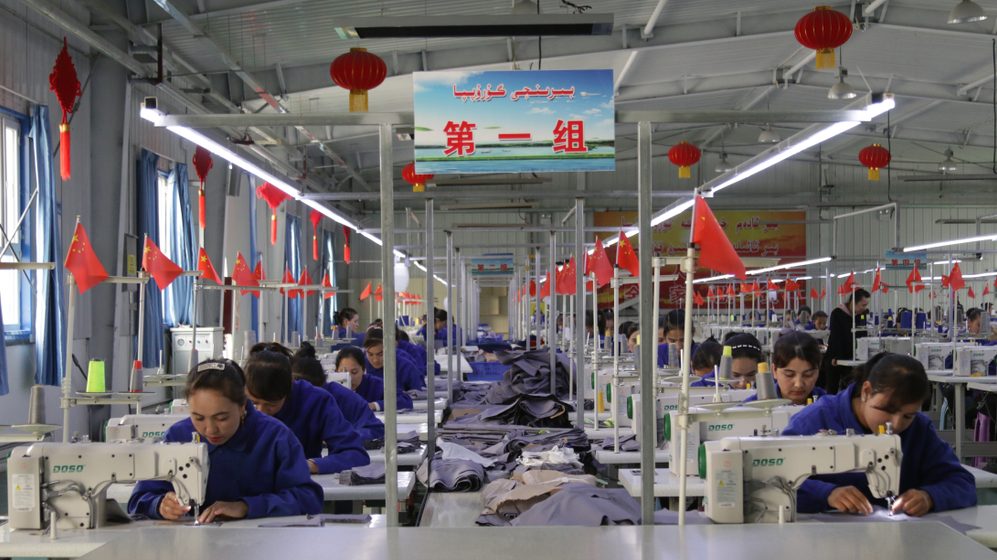The State Department on Monday said that Chinese sanctions of U.S. officials will not stop the U.S. from holding China accountable for abuses of Uyghurs.
“These threats will not deter us from taking concrete action to hold CCP officials accountable for their ongoing campaign of human rights abuses against members of ethnic and religious minorities in Xinjiang,” a state department spokesperson told CNA July 13.
Earlier on Monday, China’s foreign ministry announced sanctions on U.S. officials for speaking out about the mass detention of Uyghurs and other ethnic minorities in Xinjiang.
“It must be stressed that Xinjiang affairs are purely China's internal affairs. The US has no right and no cause to interfere in them,” Hua Chunying, spokesperson for China’s foreign ministry, said on Monday.
China sanctioned U.S. religious freedom ambassador Sam Brownback, along with the Congressional-Executive Commission on China, Sens. Marco Rubio (R-Fla.) and Ted Cruz (R-Tex.), and Rep. Chris Smith (R-N.J.). China did not specify the details and scope of the sanctions, although Rep. Smith said in a press release that his sanctions denial of an entry visa into the country.
According to observers, anywhere from 900,000 to 1.8 million Uyghurs and other ethnic minorities have been imprisoned in Xinjiang, China’s far northwest province. The government has set up more than 1,300 detention camps where survivors have reported experiencing indoctrination, torture, beatings, and forced labor.
The AP reported on June 29 that many Uyghurs had also reported being forced by authorities to implant IUDs and take other forms of birth control, as well as being forced to undergo abortions and sterilizations in order to enforce China’s family planning policies. One expert told the AP that the campaign is “genocide, full stop.”
In addition, authorities have set up a system of mass surveillance in the region to track the movements of people, one that includes DNA sampling and facial recognition technology, as well as predictive policing platforms.
The bipartisan Congressional-Executive Commission on China—listed for sanctions by China—warned in its most recent annual report that authorities in Xinjiang “may be committing crimes against humanity against the Uyghur people and other Turkic Muslims.”
Rubio and Smith were among the members of Congress sanctioned by China on Monday, and they each authored versions of the Uyghur Human Rights Policy Act which imposed sanctions on Chinese officials complicit in the abuses committed against Uyghurs.
Rubio’s version of the legislation was eventually signed into law by President Trump on June 17, but the administration did not immediately impose the sanctions on culpable officials.
On July 9, the U.S. issued visa sanctions against Chen Quanguo, Communist Party Secretary of Xinjiang, and two other party officials of the region, Zhu Hailun and Wang Mingshan, as well as their immediate family members.
The Treasury Department also issued financial sanctions against Chen, Zhu, Wang, and Huo Liujun, a former police official in Xinjiang, blocking their assets and entities in the U.S. and forbidding U.S. persons from doing business with them.
On Monday, China imposed sanctions on U.S. officials in response. The State Department said that the retaliatory measures “further demonstrates the CCP’s refusal to take responsibility for its actions.”
“There is no moral equivalency between these PRC sanctions and actions taken by countries holding accountable CCP officials for their human rights abuses,” the State Department said on Monday.
Smith said that in remarks on the House floor, he had accused Chinese president Xi Jinping of direct culpability in “the genocide against the Muslims” in Xinjiang.
“The U.S. sanctions Chinese officials for egregiously abusing human rights and Beijing responds by sanctioning Members of Congress for defending human rights,” he stated on Monday.

